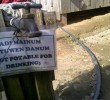DAVAO CITY – A pair of Philippine Eagles was released to the Mt. Kitanglad range in Bukidnon just after daybreak on October 29, 2009. The simultaneous release of two Philippine Eagles was a first for the Philippine Eagle Foundation (PEF) since it started its release program back in 2004.
�These experimental releases set the stage for a full-scale reintroduction of Philippine Eagles in the future,� says Jayson Iba�ez, research director of PEF. However, Iba�ez said there is much to learn with each eagle that we release to the wild.
The twin releases were in keeping with the PEF’s goal of augmenting populations of the endangered Philippine Eagle (Pithecophaga jefferyi) in the wild. The experimental release aims to test protocols for reintroducing captive-bred eagles to natural habitats, observe post-release behavior of captive-bred eagles, and train research personnel on a variety of eagle observation and release techniques.
Partnership
The release of Hineleban and Kalabugao is a joint undertaking among the PEF, a private corporation, local government units and several government agencies.
�As a company engaged in agricultural activities, Unifrutti realizes that the environment plays a crucial factor on the sustainability of [our] success,� Unifrutti Philippines President Herminio Martin said. �We take to heart our responsibility to take care of the environment for the present as well as the generations to come.�
Unifrutti adopted Hineleban, a captive-bred male Philippine Eagle hatched in 2006. Hineleban is a Binukid word that refers to the Mother Tree of the Forest responsible for nourishing all life. The adoption is for a six-year period.
The Department of Environment and Natural Resources (DENR) in region 10, through the Protected Areas and Wildlife Bureau and the Protected Area Management Board of Mt. Kitanglad, was instrumental in the planning of the release, as were partners in the United States who assisted the PEF by funding the purchase of devices needed to conduct the release. The Peregrine Fund donated one satellite transmitter and provided the basis for the release protocol followed by the PEF, while the Houston Zoo provided for the radio transmitters that were strapped on to each bird.
The local governments of Sumilao, where the release site is located, and Impasugong, from where eagle Kalabugao was rescued, have been instrumental in the mounting of education campaigns across the municipalities to ensure that the communities understand and respect the presence of the eagles and prevent the tragic ending of eagle Kagsabua from happening again.
Kagsabua was released to Mt. Kitanglad in 2008, only to be shot dead and eaten by a man and his neighbors a few months later. The PEF and the DENR have filed a case against the perpetrator who violated the Wildlife Act which protects endangered species and wildlife habitats.
Two-year old female Kalabugao was admitted to the care of the PEF in March 2008. A .22 caliber pellet on her right leg and from suffering other bone and muscle injuries.
Not new
The protected Mt. Kitanglad Mountain Range has become a focus site of Philippine Eagle research here in Mindanao . One of the Philippines ‘ last remaining rainforests, all 31,297 hectares of the range host rare and endemic wildlife such as the endangered Philippine Eagle. Previous records show that there are two active breeding pairs of Philippine Eagles in Mt. Kitanglad .
�This release in Mt. Kitanglad is another opportunity for us to understand the behavior of our Philippine Eagle. The fact that Mt. Kitanglad is a protected area with a unique ecological diversity makes it suitable for this experimental release,� explains Jayson Iba�ez.
Monitoring
Monitoring of Hineleban and Kalabugao will continue for one month after the release and a monthly seven-day monitoring thereafter. Radio and satellite transmitters attached to the back of each eagle will aid the monitoring team in the subsequent collection of data on the eagles’ status, behavior and how they respond to the release environment.
�This opportunity to release eagles to their natural habitats will hopefully end with Hineleban and Kalabugao dispersing and establishing territories of their own,� PEF executive director Dennis Salvador said. �It could mean that there are still enough forests out there to sustain eagle populations. At this time, when we are starting to feel the effects of global warming and climate change, having healthy forests is crucial to mitigate these effects.�
For reference:
Tatit Quiblat or Richard Bautista
Communications Team
Philippine Eagle Foundation
Landline number, 082-271-2337










